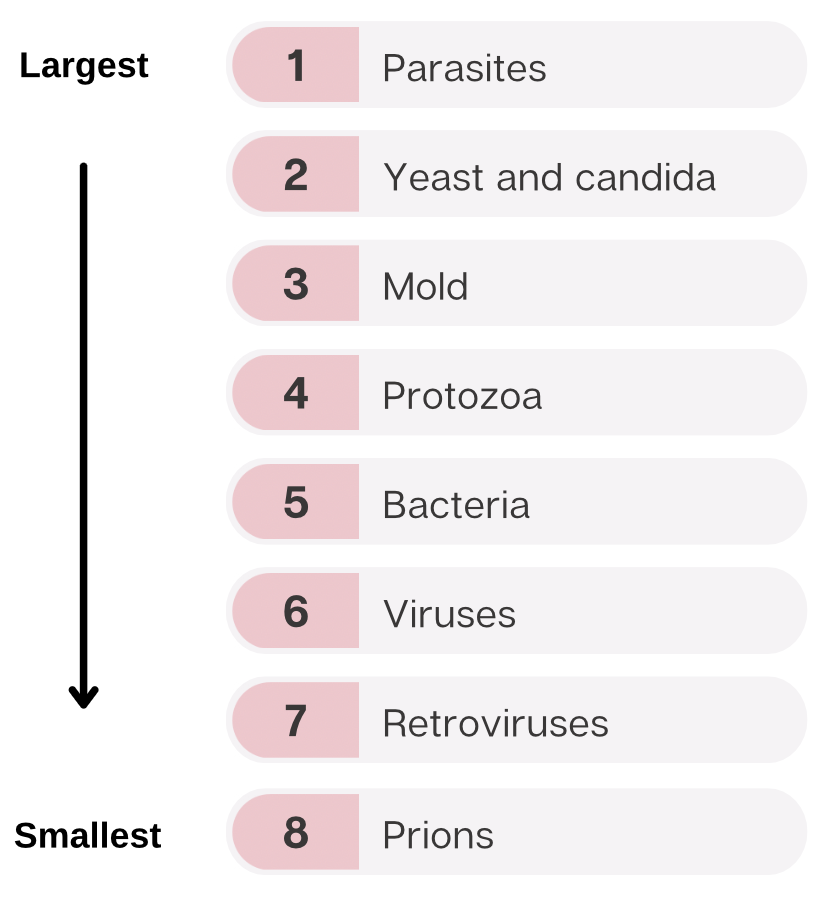Q&A: Do We All Have Parasites?
Jul 31, 2023Ready to parasite cleanse? Can't wait to teach you how in the Parasite Detox Course.
What exactly are parasites?
Parasites, as pathogens, thrive by living on or within other organisms, relying on their hosts for nourishment – in this case, us. While some are too tiny to see, others are visible to the naked eye. Some examples of parasites include:
- roundworms
- tapeworms
- pinworms
- whipworms
- liver flukes
- hookworms
- lice
- giardia
- mosquitos
- bedbugs
- scabies
What do parasites do?
These intruders can infiltrate various parts of our bodies, from muscles and lymph to the brain, gut, lungs, liver, and beyond. By obstructing organs and interfering with their function, parasites can lead to health issues. For instance, certain worms may block intestinal valves or clog bile ducts.
Parasitic infections occur when these organisms grow, reproduce, and invade our organ systems, causing illness. While some individuals may experience severe symptoms, others might remain asymptomatic for years.
The Hierarchy of Pathogens
Pathogens should be addressed in order. We should always start by addressing the largest ones first. Parasites in particular act like bulletproof sleeping bag. They hide and protect other pathogens. When encountering clients that have struggled with unresponsive treatments for conditions like SIBO, candida overgrowth, Lyme infections, and more, my immediate consideration turns to parasites and toxins. Addressing parasites effectively necessitates addressing environmental toxins as well, as toxins act as a constant magnet for parasites.

What are some of the signs and symptoms to look out for?
Toxins released by parasites can induce a variety of symptoms. Among the most common are:
- GI issues such as constipation, diarrhea, gas, bloating, and nausea
- Getting diagnosed with IBS or IBD
- Traveler’s diarrhea after or while traveling
- Digestion not being the same after a food poisoning episode
- Having trouble falling and staying asleep. You might find yourself waking up several times during the night
- Skin issues such as rashes, hives, rosacea, or eczema
- Grinding your teeth in your sleep, being diagnosed with bruxism
- Having painful, aching muscles or joints
- Experiencing fatigue, mood changes, depression, or frequent feelings of apathy
- Never feel satisfied or full after your meals.
- Being diagnosed with iron deficiency anemia
- Being diagnosed with vitamin B12 deficiency
This isn't an exhaustive list of signs and symptoms, but it's an excellent place to start if you believe you're dealing with parasites.
What’s the best test for parasites?
Unfortunately, there is no test available that can rule out parasites. I will break down each available test and explain the downsides.
- A blood test
- A blood test will detect some but not all parasites.
- A comprehensive stool test with parasitology
- For this test samples of your stool will be collected and checked for parasites and their eggs.
- Tip: Always ask your doctor for a 3+ day stool test. Most of the time parasites are missed. Multiple stool samples ensure that we get a better picture.
- GI Map test
- This is an even better option than the comprehensive stool test, in that it looks for the DNA fingerprint. It is highly sensitive and will pick up on any trace left by a parasite in your GI tract even if it was missed in your comprehensive stool analysis test. However, this can only look for what it can find.
- An endoscopy or a colonoscopy
- These tests may be ordered if the results of a stool exam are inconclusive. While you are sedated, your doctor will pass a thin flexible tube through your mouth or rectum and into your digestive system to examine your intestinal tract.
- Many parasites, however, like roundworms, live in the small intestine, which is not fully explored during either test.
- X-rays, magnetic resonance imaging (MRI), or computerized axial tomography (CAT):
- These tests can be used to look for parasitic infections that may cause lesions in the organs.
- In many cases, doctors would have to open you up to confirm.
In the past 2 years, I've had many clients do parasite cleansing.Shockingly, more than 80% of those who did a GI Map test had negative results and yet passed parasites in their stool.
💌 Like what you're reading?
Join my Inner Circle to get weekly insights that go even deeper — plus early access to new articles, webinar invites, and exclusive tools to support your healing journey.






